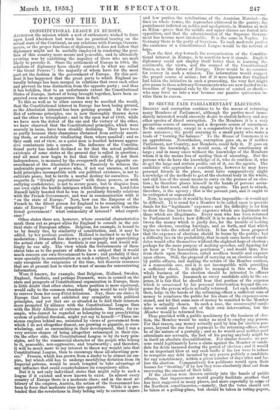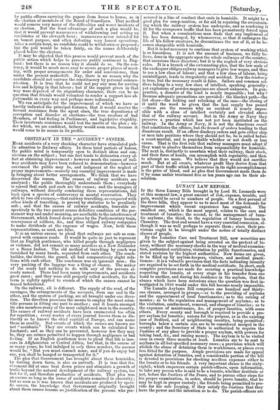TO SECURE FAIR PARTJ A mENT.ARY ELECTIONS. BRIBERY and corruption
continue to be the means of returning many Members of Parliament, although the parties most imme- diately interested would sincerely desire to abolish bribery and any other species of direct corruption. To the Members it is a very precarious source of success, and a desperate source of uneasiness. To the constituency, except in a comparatively few eases, it is a mere nuisance ; the profit accruing to a small party who make a trade of "turning the balance." To the House of Commons it is an opprobrium. Nevertheless, corruption goes on, as if neither Parliament, nor Country, nor Members, could help it. It goes on without the knowledge, it would seem, of the constituency at large ; and in many cases without the knowledge of the Members whom it is the means less of seating than of unseating. But the persons who do have the knowledge of it, who do continue it, who do get the large and certain profits out of it, are the agents. The candidate who approaches a constituency, however he may have personal friends in the place, must have comparatively slight k nowledge of the methods to get at the electoral body in the whole, and still less of the usual means to carry on the process of an elec- tion; he therefore places himself in the hands of persons accus- tomed to that work, and they employ agents. The part to attack, therefore, is the agency ; that is the pecemit part, and it ought to be extirpated or superseded.
Now, to supersede it would be less than impossible—it would not be difficult. It is usual for a Member to be called upon to provide funds for his "legitimate" expenses ; and the difficulty is for him to draw the line between the expenses which are legitimate and those which are illegitimate. Every man who has been returned to Parliament knows how difficult it is to make a distinction be- tween the money which is justly due, for the trouble of looking up the electors, erecting hustings, and so forth, and that which begins to take the colour of bribery. It has often been proposed that the expenses of elections should be borne by the public; but a difficulty lies in the probability, that in such cases hosts of candi- dates would offer themselves without the slightest hope of election ; perhaps for the mere purpose of making speeches, and figuring for an hour as "the honourable gentleman " ; and would thus, free from check upon themselves, entail needless trouble and expense upon others. Still, the proposal of carrying on an election entirely by public officers, and making the return of the Member costless, is a reasonable one, and it is not incompatible with providing a sufficient cheek. It might be managed in this wise. The whole business of the election should be intrusted to officers paid by the public. Inasmuch as every candidate adds to the ex- pense, it is fair that he should bear that portion of the expense which is occasioned by his personal intervention beyond the ex- pense for the person who is actually returned. Let each candidate, then, lodge in the hands of the returning-officer a sufficient suns of money to reimburse the public for his share of the expenses occa- sioned, and let that same sum of money be remitted to the Member who is actually chosen. In such a case, the unsuccessful candi- dates would meet the cost of their own intervention, but tile Jirember would be returned free.
Thus provided with a public machinery for the business of elec- tion, the Member would be under no need to employ any person. For that reason, any money actually paid by him for election pur- poses, beyond the one fixed payment to the returning-officer, must be of the nature of a gratuity ; and as he would need neither paid attendants nor servants, the fact of his paying anybody might be in itself an absolute disqualification. For similar reasons, no per- sons could legitimately have a claim against the Member or candi- date for debts incurrea during the period of election ; and it would be an important blow at any such traffic if the law were to refuse to recognize any debt incurred by any person publicly a candidate for any constituency, within a given number of days after and be- fore the election. Comparatively, few publicans would open their houses for "treating," if by law they were absolutely shut out from recovering the amount of their If the election were thrown entirely into the hands of public officers, that improvement would greatly facilitate another that has been suggested in many places, and more especially in some of the Northern constituencies,—namely, that the votes should not be taken at a polling-place, but should be taken in voting-papers, by public officers carrying the papers from house to house, as in the election of members of the Board of Guardians. That method would remove very many of the difficulties and worst incidents of an election. Not the least advantage of such a plan would be, that it would prevent manceuvres of withdrawing and setting up candidates at the eleventh hour ; manceuvres never intended for an honest purpose, and often defeating very honest operations. After a certain hour, no candidate could be withdrawn or proposed ; but the poll would be taken fairly, on the names deliberately placed before the electors. It may be objected that this process would prevent much of the public action which helps to preserve public sentiment in Eng- land: but there is no reason why it should do so. On the con- trary, it would be much more easy to secure proper places of meet- ing, with proper arrangements for order and convenience, than under the present makeshift. Nay, there is no reason why the .-candidate should not canvass the constituency by personal commu- nication. It is true that he could not pay any man for serving him and helping in that labour ; but if the support given in that way were deprived of its stipendiary character, there can be no question that friends would volunteer to render a support less ob- jectionable in every way and perhaps more influential.
We can anticipate for the improvement of which we have so hastily indicated the principal features, that it would receive the fiercest resistance from the agent class, the true depositories of corruption and disorder at elections—the true creators of bad Members, of bad feeling in Parliament, and legislative stupidity. Their inveterate resistance would test the merits of the plan ; un- der which, we are confident, bribery would soon cease, because it would cease to be secure in its profits.



























 Previous page
Previous page